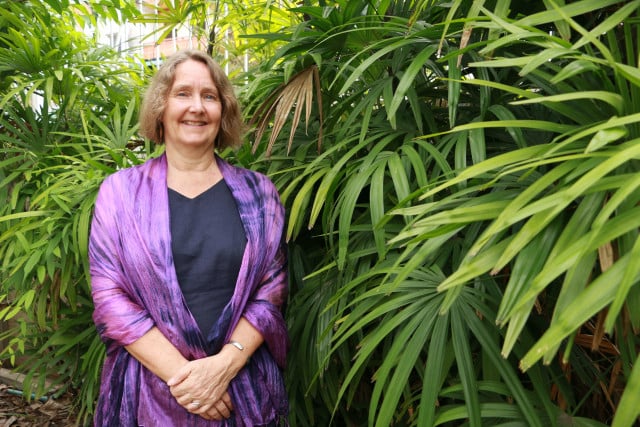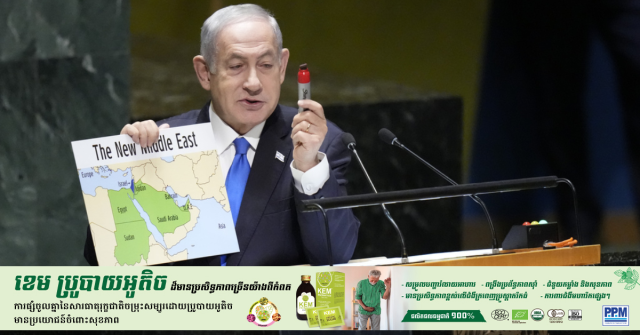COP26 Must Be a Game Changer to Curb Global Warming, Says UK Ambassador Tina Redshaw

- By Sao Phal Niseiy
- October 30, 2021 5:38 PM
The 26th UN Climate Change Conference of the Parties (COP26) starts in Glasgow under the United Kingdom (UK) leadership on Oct. 31. Many people across world are looking at the UK with high expectations that results will be achieved including pushing forward a drastic reduction of greenhouse gases, mobilization of finance as well as provisions for further support for the least developed nations that are vulnerable to the climate crisis. Sao Phal Niseiy sat down with UK Ambassador to Cambodia Tina Redshaw to discuss the summit as well as the UK’s strategy aiming to rally global efforts to deal with the climate crisis.
Sao Phal Niseiy: The whole world is looking at the COP 26 as leading global efforts to address the climate crisis. What can we expect from the UK leadership to galvanize global efforts and deliver concrete results?
Tina Redshaw: COP26 needs to be a game changer in tackling climate change. It is our top priority and we have put the weight of our network, institutions and convening power to deliver a step change in ambition. We have already seen a change in ambition. At the G7 [Summit], all members committed to reaching net zero by 2050. This is one in a long list of commitments. As presidents, we have been promoting four key goals to governments around the world, driving real progress on a global scale. Firstly, mitigating against increases in emissions to secure net zero emissions and limiting global temperature increases to 1.5 Celsius. Secondly, adapting and changing the way we operate to protect natural habitats and communities. Thirdly, mobilising global finance to deliver on the global commitment of $100 billion per year in global finance. Lastly, working together to accelerate action. Climate change will take a collective effort. Delivering on these four goals will also make our recovery from COVID-19 one that builds a better future - one with green jobs, cleaner air and increasing prosperity, without harming the planet.
Sao Phal Niseiy: Achieving net zero emission has been one of the ambitious goals, and it is a vital step to prevent the global temperature from rising over 1.5 degree Celsius. What does the UK plan to do to ensure that this pledge will be lived up to?
Tina Redhsaw: When the UK took on the Presidency of COP26, only 30 percent of the global economy was covered by net zero targets. This is now up to around 70 percent and I expect it to increase further. Businesses are also moving in line with the Paris Agreement. By signing up to our Race to Zero, over 3,000 companies and 170 investors, have committed to halving emissions by 2030 and achieving net zero emissions by 2050 at the latest, with transparent and robust action plans. This is the result of extensive work over a couple of years to support countries in the development of their plans. It is the first step of many. We are pushing for countries to front load their commitments and actions so we see an impact by 2030 to ensure we keep 1.5 degree in reach. However, our efforts can’t stop at COP26. Ambition alone is not enough. We will need to push strongly to ensure ambition is matched by action and we need to be prepared to call out countries that are not performing including our own.
Sao Phal Niseiy: Cambodia is one of the most vulnerable to the climate crisis, and has currently been witnessing more adverse impacts of climate crisis including extreme weather events such as droughts and floods. The country needs to build both resilience and adaption capacity, but these will require more financial support. One of the global pledges is mobilization of $100 billion to support the least developed as well as the worst affected countries by the climate impacts. How optimistic we can be when it comes to making pledges a reality under the UK leadership?
Tina Redshaw: Finance underpins all the action we want to see globally. That is why we have made it one of our top priorities and launched a delivery plan [so] the $100 billion commitment will be obtained. There is a long way to go but we have seen significant progress. Since March [2021], concrete new announcements have been made by a number of major developed countries including the US, Germany, Canada, Japan, Denmark, Sweden, the European Commission, and New Zealand among others, representing billions of additional dollars beyond pre-existing pledges. The UK is leading by example and doubled our International Climate Finance spend to at least £11.6 billion [approx. $16 billion] between 2021-2025 and is mostly split between mitigation and adaptation. Whilst finance is crucial, it needs to be matched with clear political ambition and realistic planning.
Sao Phal Niseiy: In term of climate actions, would you highlight some of the UK programs that aim at assisting Cambodia to both build its resilience while reducing carbon emissions as part of the effort to reach net zero?
Tina Redshaw: We have partnered with the Ministry of Environment and the Cambodia Climate Change Alliance to support the development of a Long Term Strategy for Carbon Neutrality. This is a key document to set the tone for government activity and opens the door for the adaptation and mitigation measures required to develop real change. At UNGA [United Nations General Assembly], we announced that the Lower Mekong (Cambodia, Laos and Vietnam) would be included in our £100 million [approx. $137 million] Biodiverse Landscape Fund which will invest in local projects that support the protection and restoration of landscapes through nature-based solutions. This compliments our Darwin Initiative programme that has funded projects in Cambodia over the last two decades.
Sao Phal Niseiy: COP26 also focuses on spelling an end to public finance for coal and other dirty fossil fuel. In the Cambodian context, moving away from coals appears to be somewhat challenging as the country still relies on these energy sources despite its commitment to reducing greenhouse emissions and expediting energy transition. So, what is the UK role in supporting Cambodia’s energy transition?
Tina Redshaw: We have been clear from the outset – Coal is a dying energy source that needs to be transitioned away from. We recognise that this takes time but the ambition needs to be set. We have seen big announcements on coal financing by regional powers. We are encouraging Cambodia to state they will no longer accept any new coal power plants and urge them to reconsider those that have been planned but not built. The business case for renewable energy is clear and the next generation of growing economies are already making the switch. We have been working with the Government through our ASEAN Low Carbon Energy Program and supporting improvements in energy storage, energy efficiency and energy infrastructure. These are long term investments. We have also been encouraging British businesses to invest in Cambodia’s renewable energy sector.
Sao Phal Niseiy: The climate crisis now is not just about natural disasters but a threat to public health and national security. What do you think Cambodia, as a developing country with limited resources, can do more to contribute to tackling the climate crisis?
Tina Redshaw: The first step is recognising that climate change is not solely an issue for the Ministry of Environment. We have been encouraging a whole of government approach in setting a higher ambition. It was a positive step to see more government departments included. This is the approach we are also taking at COP26; the programme has been designed to look at the impact of climate change on a range of sectors including public health, gender equality, transport, youth etc. Public Health is particularly pertinent in Cambodia. We have seen globally that as cities get bigger, pollutants and waste increase. 800,000 deaths per year globally are from pollution including the burning of coal. This is a direct cost to societies and health care systems. Cambodia has the ability to address this now through an assessment of the health care supply chains, investigating the sources of pollutants and installing waste management infrastructure.















